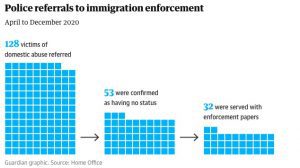Groups working with women and the vulnerable say the policy deters crime victims from seeking help, and emboldens attackers. Photograph: Brian A Jackson/Shutterstock
Exclusive: Home Office documents show officers referred more than 2,000 victims of serious crime
Children who have been sexually exploited and women who have been attacked by their partners are among more than 2,000 victims of serious crime whom police reported to immigration enforcement, two government documents reveal.
Between 2020 and 2022, UK police reported 2,546 victims of crimes such as domestic abuse, child sexual exploitation, adult sexual exploitation, human trafficking and modern slavery to immigration enforcement, a Home Office document shows.
Another Home Office document seen by the Guardian – marked “official, sensitive” – shows that a quarter of domestic abuse victims referred by police to immigration enforcement were “served with enforcement papers”.
Groups working with women and the vulnerable say the policy deters crime victims from seeking help, and emboldens attackers.
David Carrick, the Met officer and serial rapist, intimidated one of his victims by threatening to report her to immigration if she told of his attacks on her.
A senior Conservative MP said that by reporting victims of serious crimes to immigration enforcement, police were making them “victims twice over”, and the domestic abuse commissioner said the practice risked putting them in extra danger.
In 2020, His Majesty’s Inspectorate of Constabulary called for an end to reporting domestic abuse victims to immigration unless there was clear evidence of an immigration offence, saying “significant harm is being caused to the public interest”. Police chiefs and the Home Office disagreed.
Data obtained by the news website the Detail under freedom of information laws shows that from 2020 to 2022, at least 423 victims of domestic abuse – believed to be overwhelmingly female – were reported to the immigration enforcement unit of the Home Office.

A total of 2,546 victims of serious crime were reported to the unit, including at least 67 victims of child sexual exploitation, 11 victims of domestic servitude, 20 victims of forced marriage, 601 victims of human trafficking, 749 victims of modern-day slavery and 51 people who suffered sexual exploitation.
The Metropolitan police, the UK’s biggest force, made the most referrals of crime victims to immigration enforcement, 460. The UK’s second biggest police force, Police Scotland, made 207 referrals.
The third biggest force, West Midlands police, made 222 referrals; West Yorkshire, the fifth biggest, made 143; and Greater Manchester police, the fourth biggest, made 132.
Southall Black Sisters, based in west London, said the cases they had seen included a woman who escaped female genital mutilation in Nigeria, fled and came to live with a relative in the in the UK only to be kept prisoner in the house. Her visa expired, and she became an overstayer and her wish to escape the abuse was thwarted because she was too scared to call the police, fearing she may be deported. Eventually she got help.
Another woman in the UK on a spousal visa was abused by her husband and intimidated with threats that she would be deported and separated from her child if she called the police. She still has not.
A second Home Office document shows that a quarter of domestic abuse victims police referred to immigration were served with enforcement papers, meaning their coming forward to report a crime had led to them being considered for deportation.
The document marked official/sensitive, obtained by the Guardian, covers from April to December 2020. Of 128 “referrals of domestic abuse victims”, the number of domestic abuse victims served with enforcement papers was 32, the document says, adding that none were detained.
Nicole Jacobs, the domestic abuse commissioner for England and Wales, said: “It is extremely concerning to see these statistics that show that every police force has shared details from migrant survivors of domestic abuse with immigration officials.
